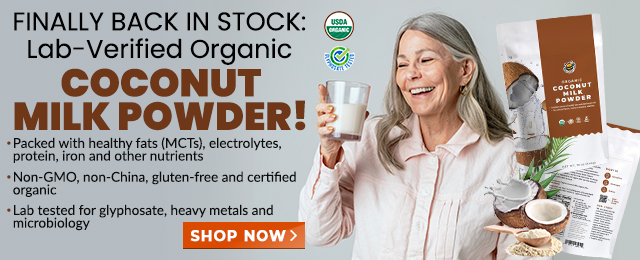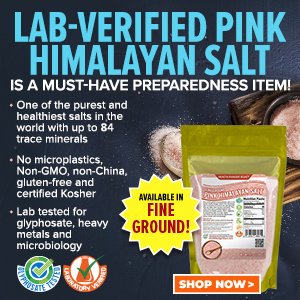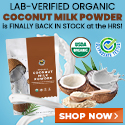
Anti-caking food additives lower nutritional content of foods
Tuesday, October 11, 2011 by: Amelia Bentrup
Tags: food additives, nutrition, health news
- Aerosolized bioweapons? Strange “diploid biomasses” falling out of the sky in Florida captured under the microscope
- Widespread social and economic unrest: Steve Quayle issues urgent financial warning of imminent asset collapse in new interview with Mike Adams
- Israeli lobbyists boast of controlling US national security policy in leaked AIPAC audio
- U.S. lawmakers investigate Meta over alleged China collaboration
- Analysis: The coming economic collapse, a mass uprising and Trump's three secret weapons to halt the growing revolt
- Kiss Your Genetic Privacy Good-Bye! 23andMe Gets Green Light to Sell Your Intimate Genetic Details to Anyone They Want
- Fauci is back in the limelight, and he’s busy promoting a future COVID or FLU pandemic
- Mike Adams releases country western hit single: Goin’ Back in Time is Comin’ Home
- Warp Speed 2.0: Trump Administration ACCELERATES Gates-funded, self-amplifying bird flu vaccines
- TAKE IT DOWN Act advances in Congress amid free speech concerns
- CLOT SHOT PLANDEMIC UNFOLDING: Fibrous, rubbery clots caused by covid injections have prion-like seeding activity
- DMSO and Natural Dyes: A suppressed cancer treatment resurfaces in independent research
- Tulsi Gabbard leads charge against the Biden regime’s global censorship of the 'Disinformation Dozen'
- Curcumin’s ancient healing power supercharges muscle recovery, and its effects are compounded with anti-inflammatory foods and supplements
- Father speaks out: Challenging the mainstream narrative of his daughter’s “unvaccinated measles death”
- Defunding DEADLY mRNA jabs: Government funding for mRNA technology being scrutinized and sidelined until proven "safe and effective" for real
- Pfizer's RSV vaccine linked to preterm births as drug giant CONCEALED RISKS from pregnant women in unethical clinical trials
- Chemical cocktails in processed foods linked to diabetes, validating natural health warnings
- Aerosolized bioweapons? Strange “diploid biomasses” falling out of the sky in Florida captured under the microscope
- Fauci is back in the limelight, and he’s busy promoting a future COVID or FLU pandemic
- Tulsi Gabbard leads charge against the Biden regime’s global censorship of the 'Disinformation Dozen'
- Analysis: The coming economic collapse, a mass uprising and Trump's three secret weapons to halt the growing revolt
- Widespread social and economic unrest: Steve Quayle issues urgent financial warning of imminent asset collapse in new interview with Mike Adams
- Kiss Your Genetic Privacy Good-Bye! 23andMe Gets Green Light to Sell Your Intimate Genetic Details to Anyone They Want
- U.S. lawmakers investigate Meta over alleged China collaboration
- Mike Adams releases country western hit single: Goin’ Back in Time is Comin’ Home
- Israeli lobbyists boast of controlling US national security policy in leaked AIPAC audio
- Chemtrails unveiled: How the CIA and Big Business are manipulating the weather for profit
- Curcumin’s ancient healing power supercharges muscle recovery, and its effects are compounded with anti-inflammatory foods and supplements
- CLOT SHOT PLANDEMIC UNFOLDING: Fibrous, rubbery clots caused by covid injections have prion-like seeding activity
- China’s counter-tariff strategies: A new chapter in the U.S.-China trade war
- Pfizer's RSV vaccine linked to preterm births as drug giant CONCEALED RISKS from pregnant women in unethical clinical trials
- Shedding light on the dark side of MMR vaccines: How vaccinated individuals SPREAD MEASLES & put the vulnerable at risk
- Dane Wigington exposes climate engineering as ‘All-Out Weather and Biological Warfare’
- Defunding DEADLY mRNA jabs: Government funding for mRNA technology being scrutinized and sidelined until proven "safe and effective" for real
- DEATH by VACCINE or face PRISON time: Canadian Freedom Convoy leaders CONVICTED for protesting forced vaccination during the Covid Plandemic
- Newly released JFK files reveal Pentagon's role in creating Lyme disease and covid in the same lab
- Analysis: The coming economic collapse, a mass uprising and Trump's three secret weapons to halt the growing revolt
- Mike Adams releases country western hit single: Goin’ Back in Time is Comin’ Home
- Aerosolized bioweapons? Strange “diploid biomasses” falling out of the sky in Florida captured under the microscope
- Kiss Your Genetic Privacy Good-Bye! 23andMe Gets Green Light to Sell Your Intimate Genetic Details to Anyone They Want
- European Court of Justice: Healthcare professionals who promoted or administered COVID-19 vaccines are CRIMINALLY LIABLE for any harm caused
- Federal employees whine over DOGE's new directive requiring them to do a 5-point summary of weekly accomplishments
- U.S. approves new Russian ambassador as diplomatic thaw continues
- Government waste exposed: Hegseth supports Musk’s demand for accountability from federal workers
- Now you can HEAR chemistry: Health Ranger translates molecules into music in stunning video demonstration that will blow your mind (and your ears)
- Widespread social and economic unrest: Steve Quayle issues urgent financial warning of imminent asset collapse in new interview with Mike Adams
- Dr. Mike Yeadon releases 15-minute testimony - WATCH - about genocidal intent of COVID “vaccines”
- The Health Ranger releases “Vaccine Zombie” song and music video, using AI-animated zombies for the music video
- Trump reverses course on Gaza plan, says “nobody is expelling Palestinians”
- EPA advisor admits the agency is funneling billions to climate groups ahead of Trump’s return to White House
- 5 Simple steps to boost your brainpower: How to strengthen executive function in a distracted world
- I Want My Bailout Money – new song and music video released by Mike Adams
- Tulsi Gabbard leads charge against the Biden regime’s global censorship of the 'Disinformation Dozen'
- Red Cross issues warning to stop blood plasma donations from vaccinated people
- Scientists confirm: GENIUS brain function can be spontaneously unleashed in humans without any apparent cause
- EPA advisor admits the agency is funneling billions to climate groups ahead of Trump’s return to White House
- HYSSOP: What research reveals about the health benefits of this ancient holy herb
- Two containers with completed ballots fall out of truck in Florida
- Newly released JFK files reveal Pentagon's role in creating Lyme disease and covid in the same lab
- Global leaders unite to clamp down on “misinformation” with UN-backed Cascais Declaration
- BREAKING: 2025 NDAA authorizes mandatory military draft of WOMEN across America… as Pentagon pursues global NUCLEAR war with both Russia and China at the same time
- Mike Adams releases country western hit single: Goin’ Back in Time is Comin’ Home
- Michael Yon warns of a ZIONIST TAKEOVER in Trump’s second administration
- Ozempic and Wegovy weight loss drugs are injectable LIZARD VENOM PEPTIDES that may unleash a devastating wave of organ failure… side effects align with symptoms of SNAKE BITES
- The Health Ranger releases “Vaccine Zombie” song and music video, using AI-animated zombies for the music video
- BOMBSHELL: DNA testing kits are a SCAM to develop ethnic-specific bioweapons
- Israeli soldiers accused of even more torture and abuse in the West Bank
- These 13 countries just signed an agreement to engineer a global FAMINE by destroying food supply
- I Want My Bailout Money – new song released by Mike Adams
- NASA admits that climate change occurs because of changes in Earth’s solar orbit, and NOT because of SUVs and fossil fuels
- RFK Jr. clears key hurdle: Sen. Susan Collins backs controversial HHS nominee, signaling a new era for health policy
Anti-caking agents are small chemicals that absorb moisture and prevent other compounds from sticking together. These agents are frequently added to table salt and other common powdered food products. Anti-caking agents are often composed of phosphate, carbonate, silicate or oxide compounds. Many of these compounds contain aluminum, such as sodium alumino-silicate, alumino-calcium silicate and aluminium silicate. Aluminum is well-known to be toxic to the body, and high levels can cause damage to the kidneys, muscles, digestive system and bones. High levels of aluminum exposure may also be linked to Alzheimer's disease.
If that isn't enough reason to stay away from food products containing anti-caking agents, then this study provides a further reason. Powdered vitamin C is frequently added to powdered foods to increase the nutritional content. Typically, vitamin C degrades at 86% humidity, and once the chemical structure changes, the nutritional value is lost. Anti-caking agents work either by coating the vitamin C crystals and protecting them from moisture, or by absorbing the moisture themselves and preventing the vitamin C from absorbing it. However, the anti-caking agents themselves may clump together leaving some of the vitamin C exposed, or they may absorb so much moisture they become saturated. This changes the Ph around the vitamin and actually lowers the humidity level at which it degrades.
This recent study confirms what many readers already know. Avoid powdered, "fake" foods with additives and stick to a diet consisting of fresh, whole, and preferably organic foods.
Sources:
http://www.medicalnewstoday.com/releases/235...
https://www.naturalnews.com/010119.html
https://www.naturalnews.com/029903_aluminum_t...
About the author
Amelia Bentrup is the owner and editor of http://www.my-home-remedies.com a well-researched collection of natural home remedies. Discover natural cures for a variety of ailments and find specific information and safety guidelines for various herbs, vitamins, minerals and essential oils.Food additives at FETCH.news
Get independent news alerts on natural cures, food lab tests, cannabis medicine, science, robotics, drones, privacy and more.
Take Action: Support Natural News by linking to this article from your website
Permalink to this article:
Embed article link: (copy HTML code below):
Reprinting this article:
Non-commercial use OK, cite NaturalNews.com with clickable link.
Follow Natural News on Facebook, Twitter, Google Plus, and Pinterest
Science News & Studies
Medicine News and Information
Food News & Studies
Health News & Studies
Herbs News & Information
Pollution News & Studies
Cancer News & Studies
Climate News & Studies
Survival News & Information
Gear News & Information
News covering technology, stocks, hackers, and more



"Big Tech and mainstream media are constantly trying to silence the independent voices that dare to bring you the truth about toxic food ingredients, dangerous medications and the failed, fraudulent science of the profit-driven medical establishment.
Email is one of the best ways to make sure you stay informed, without the censorship of the tech giants (Google, Apple, Facebook, Twitter, YouTube, etc.). Stay informed and you'll even likely learn information that may help save your own life."
–The Health Ranger, Mike Adams












































